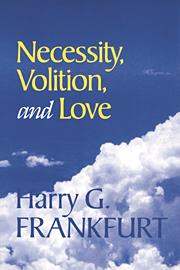Book contents
- Frontmatter
- Contents
- Preface
- Sources
- 1 The Logic of Omnipotence
- 2 Descartes's Discussion of His Existence in the Second Meditation
- 3 Descartes on the Creation of the Eternal Truths
- 4 Two Motivations for Rationalism: Descartes and Spinoza
- 5 Continuous Creation, Ontological Inertia, and the Discontinuity of Time
- 6 Concerning the Freedom and Limits of the Will
- 7 On the Usefulness of Final Ends
- 8 The Faintest Passion
- 9 On the Necessity of Ideals
- 10 On God's Creation
- 11 Autonomy, Necessity, and Love
- 12 An Alleged Asymmetry between Actions and Omissions
- 13 Equality and Respect
- 14 On Caring
11 - Autonomy, Necessity, and Love
Published online by Cambridge University Press: 15 December 2009
- Frontmatter
- Contents
- Preface
- Sources
- 1 The Logic of Omnipotence
- 2 Descartes's Discussion of His Existence in the Second Meditation
- 3 Descartes on the Creation of the Eternal Truths
- 4 Two Motivations for Rationalism: Descartes and Spinoza
- 5 Continuous Creation, Ontological Inertia, and the Discontinuity of Time
- 6 Concerning the Freedom and Limits of the Will
- 7 On the Usefulness of Final Ends
- 8 The Faintest Passion
- 9 On the Necessity of Ideals
- 10 On God's Creation
- 11 Autonomy, Necessity, and Love
- 12 An Alleged Asymmetry between Actions and Omissions
- 13 Equality and Respect
- 14 On Caring
Summary
I. There are several kinds of actions that, in one sense or another, we must perform. These actions are not coerced; nor are the movements we make when we perform them spasmodic, or in any other manner beyond our physical control. What we do is neither compulsive nor compelled. The actions are wholly voluntary. Nonetheless, we have no real alternatives to performing them.
One category of such actions is made up of the various things that we have to do because they are indispensable to the attainment of our settled goals. These are the necessities of ambition and prudence. In a second category, there are the more peremptory imperatives of moral obligation. They are the necessities of duty. These two categories do not exhaust the significantly distinct kinds of actions concerning which we recognize that we have no choice. Besides what is conditionally indispensable to us on account of our prudential interests and our ambitions, and besides the demands that are made upon us categorically in the name of duty, there are in addition the necessities of love.
I shall not attempt to provide a comprehensive analysis of the concept of love. As I shall deploy the concept, it has a very wide scope: love is a species of caring about things, and its possible objects include whatever we may care about in certain ways. Thus loving something – at least, as I propose to construe the matter – is not merely a matter of liking it a great deal or of finding it deeply satisfying, as in “loving” chocolate ice cream or the piano music of Chopin.
- Type
- Chapter
- Information
- Necessity, Volition, and Love , pp. 129 - 141Publisher: Cambridge University PressPrint publication year: 1998
- 49
- Cited by

